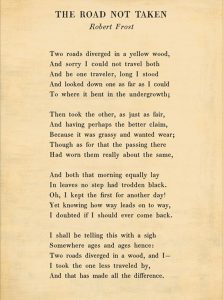
Jil Ross writes:
I have read and heard read this poem many times in my life. I love it, but had interpreted it differently. Never thought that it had a meaning almost exactly opposite of what I think. That’s kind of funny. What do you think?
I’ll still be a bit of the romantic and believe I’ll always take the road less traveled. Have a good day!
“The poem’s speaker tells us he “shall be telling”, at some point in the future, of how he took the road less traveled … yet he has already admitted that the two paths “equally lay / In leaves” and “the passing there / Had worn them really about the same.” So the road he will later call less traveled is actually the road equally traveled. The two roads are interchangeable.”
Frost wrote the poem as a joke for his friend Edward Thomas, who was often indecisive about which route to take when the two went walking.
“Whichever way they go, they’re sure to miss something good on the other path.” Regarding the “sigh” that is mentioned in the last stanza, it may be seen as an expression of regret or of satisfaction. However, there is significance in the difference between what the speaker has just said of the two roads, and what he will say in the future. According to Lawrence Thompson, Frost’s biographer, as Frost was once about to read the poem, he commented to his audience, “You have to be careful of that one; it’s a tricky poem—very tricky”, perhaps intending to suggest the poem’s ironic possibilities.
Thompson suggests that the poem’s narrator is “one who habitually wastes energy in regretting any choice made: belatedly but wistfully he sighs over the attractive alternative rejected.” Thompson also says that when introducing the poem in readings, Frost would say that the speaker was based on his friend Thomas. In Frost’s words, Thomas was “a person who, whichever road he went, would be sorry he didn’t go the other. He was hard on himself that way.”
